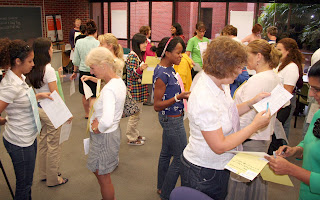
This session's goal was to introduce students to each other and demonstrate the potential for future friendships and partnerships on class projects. All these students plan to pursue doctoral degrees in the sciences.
Here's some comments from the students:
As an introvert, I was surprised by how easily I was able to begin conversations with people I had never met before and even want to continue talking past the three minute mark. It was really an effective method of breaking the ice and getting to meet your peers.
"Through the session, I was able to get to know my classmates and learn about their research interests, majors, and hobbies. It was a great way to get to know their names and start open conversation with them.
I also got to see who had similar research interests as myself. It would be great to collaborate or work with them in the future in looking for opportunities and in working on research topics.
I also realized that many of my classmates were in the same boat as me with the lack of research experience, and it made me feel better about the lack of experience I have."
I learned a lot about my fellow students. Most people in this class are interested in the sciences, particularly the fields of biology and chemistry.. Most students also seem to be on the pre-professional tract. I think a lot of students see the class as an opportunity to get involved in research. Though most conversations were about the general questions such as your major and classes you are taking, there was other topics that were more fun and carefree.
I was surprised by how curious others were about me. I thought the meeting would be awkward, but it turned out to be a great session. People were asking me all sorts of questions after reading my info card. Likewise, I was more engaged after being asked so many questions and started asking plenty of questions myself.



